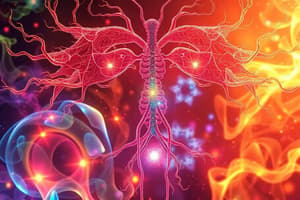Podcast
Questions and Answers
Match the following endocrine glands with their locations in the human body:
Match the following endocrine glands with their locations in the human body:
Hypothalamus = Basal part of diencephalon, forebrain Pituitary = Located in a bony cavity called sella tursica Thyroid = Endocrine gland in the human body Adrenal = Endocrine gland located on top of the kidneys
Match the following hormones with their functions in the human body:
Match the following hormones with their functions in the human body:
Gonadotrophin releasing hormone (GnRH) = Stimulates the pituitary synthesis and release of gonadotrophins Somatostatin = Inhibits the release of growth hormone from the pituitary Prolactin (PRL) = Produced by the anterior pituitary Insulin = Produced by the pancreas and regulates blood sugar levels
Match the following organs with their hormone production in the human body:
Match the following organs with their hormone production in the human body:
Pancreas = Produces insulin and regulates blood sugar levels Thymus = Produces hormones as part of the endocrine system Ovary (in female) = Produces female sex hormones like estrogen and progesterone Testis (in male) = Produces male sex hormones like testosterone
Match the following chemicals with their role in the endocrine system:
Match the following chemicals with their role in the endocrine system:
Match the following terms with their descriptions:
Match the following terms with their descriptions:
Match the following with their roles in the endocrine system:
Match the following with their roles in the endocrine system:
Match the following organs with their hormone production:
Match the following organs with their hormone production:
Match the following with their characteristics in hormone action:
Match the following with their characteristics in hormone action:
Which of the following best describes endocrine glands?
Which of the following best describes endocrine glands?
What is the current scientific definition of hormones?
What is the current scientific definition of hormones?
How do the neural and endocrine systems jointly coordinate and regulate physiological functions?
How do the neural and endocrine systems jointly coordinate and regulate physiological functions?
What is the function of hormones in the body?
What is the function of hormones in the body?
Why are endocrine glands referred to as ductless glands?
Why are endocrine glands referred to as ductless glands?
What distinguishes the new scientific definition of hormones from the classical definition?
What distinguishes the new scientific definition of hormones from the classical definition?
Which part of the brain contains neurosecretory cells called nuclei which produce hormones?
Which part of the brain contains neurosecretory cells called nuclei which produce hormones?
Which hormone originating in the hypothalamic neurons stimulates the pituitary synthesis and release of gonadotrophins?
Which hormone originating in the hypothalamic neurons stimulates the pituitary synthesis and release of gonadotrophins?
Which gland is under the direct neural regulation of the hypothalamus?
Which gland is under the direct neural regulation of the hypothalamus?
Where is the pituitary gland located in the human body?
Where is the pituitary gland located in the human body?
Which part of the pituitary gland produces growth hormone (GH) and prolactin (PRL)?
Which part of the pituitary gland produces growth hormone (GH) and prolactin (PRL)?
Which endocrine gland is mentioned as being located in a bony cavity and being attached to the hypothalamus by a stalk?
Which endocrine gland is mentioned as being located in a bony cavity and being attached to the hypothalamus by a stalk?
Which hormone from the hypothalamus inhibits the release of growth hormone from the pituitary?
Which hormone from the hypothalamus inhibits the release of growth hormone from the pituitary?
Which part of the brain is described as the basal part of diencephalon and regulates a wide spectrum of body functions?
Which part of the brain is described as the basal part of diencephalon and regulates a wide spectrum of body functions?
What are the two types of hormones produced by the hypothalamus that regulate the synthesis and secretion of pituitary hormones?
What are the two types of hormones produced by the hypothalamus that regulate the synthesis and secretion of pituitary hormones?
Which glands are mentioned as being part of the organised endocrine bodies in our body?
Which glands are mentioned as being part of the organised endocrine bodies in our body?
Flashcards are hidden until you start studying
Study Notes
Endocrine Glands and Their Locations
- Endocrine glands are located in various parts of the human body
- The pituitary gland is located in the human body below the hypothalamus and attached to it by a stalk
- The hypothalamus is located in the basal part of diencephalon and regulates a wide spectrum of body functions
Hormones and Their Functions
- Hormones are produced by endocrine glands and regulate physiological functions
- Hormones stimulate the synthesis and release of other hormones
- Hormones inhibit the release of other hormones
- Growth hormone (GH) and prolactin (PRL) are produced by the anterior pituitary gland
- Gonadotrophins are stimulated by a hormone originating in the hypothalamic neurons
Hormone Production
- The hypothalamus produces hormones that regulate the synthesis and secretion of pituitary hormones
- The pituitary gland produces growth hormone (GH) and prolactin (PRL)
- The hypothalamus produces hormones that inhibit the release of growth hormone from the pituitary
Characteristics of Hormone Action
- Hormones are produced by endocrine glands and regulate physiological functions
- Hormones can stimulate or inhibit the release of other hormones
Endocrine System
- The endocrine system is a system of glands that produce hormones to regulate physiological functions
- The endocrine system jointly coordinates and regulates physiological functions with the neural system
- Endocrine glands are referred to as ductless glands
- The new scientific definition of hormones distinguishes it from the classical definition
Brain and Hormones
- The hypothalamus contains neurosecretory cells called nuclei which produce hormones
- The hypothalamus regulates a wide spectrum of body functions
- The pituitary gland is under the direct neural regulation of the hypothalamus
Other Key Facts
- Organised endocrine bodies in the human body include the pituitary gland and other glands
- The hypothalamus produces two types of hormones that regulate the synthesis and secretion of pituitary hormones
Studying That Suits You
Use AI to generate personalized quizzes and flashcards to suit your learning preferences.





